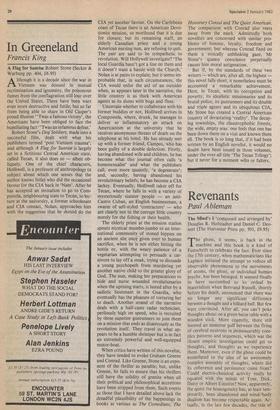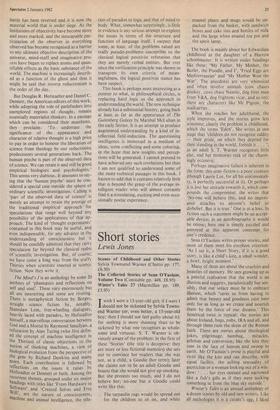Revenants
Paul Ableman
The Mind's I 'composed and arranged by' Douglas R. Hofstadter and Daniel C. Den- nett (The Harvester Press pp. 501, £9.95)
The ghost, it seems, is back in the machine and this book is a kind of Festschrift to celebrate the fact. Ever since the 17th century, when mathematicians like Laplace initiated the attempt to reduce all observable phenomena to the movements of atoms, the ghost, or individual human psyche, has been besieged. It seemed finally to have succumbed to its ordeal by materialism when Bertrand Russell, shortly before his death, announced that there was no longer any significant difference between a thought and a billiard ball. But few were convinced. After all, you can't poke thoughts about on a green baize table with a wooden stick. More cogently, there still seemed an immense gulf between the firing of cerebral neutrons in immeasurably com- plex patterns and sequences, which was the closest empiric investigation could get to thoughts, and thoughts as we experience them. Moreover, even if the ghost could be assimilated to the idea of an awesomely complex assembly of thoughts, where did its coherence and persistence come from? Could electro-chemical activity really be equated with the minds of Tom, Dick, Daisy or Albert Einstein? Now, apparently, the quest for homogeneity has, at least tem- porarily, been abandoned and mind/body dualism has become respectable again. Ac- tually, in the last few decades, the tide of
battle has been reversed and it is now the material world that is under siege. As the limitations of objectivity have become more and more marked, and the inescapable par- ticipation of the observer in everything observed has become recognised as a barrier to any ultimate objective description of the universe, mind-stuff and imaginative pro- cess have begun to replace atoms and quan- tifiable effects as the basic substance of the world. The machine is increasingly describ- ed as a function of the ghost and thus it might be said that inverse reductionism is the order of the day.
But Douglas R. Hofstadter and Daniel C. Dennett, the American editors of this work, while adopting the role of pathfinders into unexplored regions of thought, remain essentially materialist thinkers. In a passage which can be considered their manifesto, they proclaim: `To underrate the significance of the appearance and character of relative thought is a high price to pay in order to honour the liberation of science from theology by our reductionist predecessors several generations back. The human psyche is part of the observed data of science. We can retain it and still be good empirical biologists and psychologists.' This seems very dubious. It amounts to say- ing that the 'human psyche' must be con- sidered a special case outside the sphere of ordinary scientific investigation. Calling it 'part of the observed data of science' is merely an attempt to retain the prestige of the traditional empirical approach for speculations that range well beyond any possibility of the applications of that ap- proach. The kind of 'thought experiments' contained in this book may be useful, and even indispensable, for any advance in the understanding of consciousness but it should be candidly admitted that they carry speculation far beyond the classical realm of scientific investigation, But, of course, we have come a long way from the stuffy Thirties when scientists sneered at science fiction. Now they write it.
The Mind's I is an anthology by some 20 authors of 'phantasies and reflections on self and soul'. These vary enormously but all ate interesting and some are riveting. There is metaphysical fiction by Borges, straight science fiction by, notably, Stainslaw Lem, free-wheeling dialogues, heavily laced with paradox, by Hofstadter himself, a marvellous conversation between God and a Mortal by Raymond Smullyan, a refutation by Alan Turing (who first defin- ed the concept of machine intelligence in the Thirties) of classic objections to the notion of thinking machines, a view of biological evolution from the perspective of the gene by Richard Dawkins and many more. Each contribution is followed by reflections on the issues it raises by Hofstadter or Dennett or both. Among the recurrent themes, grouped under six major headings with titles like 'From Hardware to Software' and 'Created Selves and Free
are the nature of consciousness, machine and animal intelligence, the rela-
tion of paradox to logic and that of mind to body. What, somewhat surprisingly, is little in evidence is any serious attempt to explore the issues in terms of the structure and function of language itself. I suspect that some, at least, of the problems raised are really pseudo-problems susceptible to the classical logical positivist refutation that they are merely verbal entities. But ever since the verification principle was shown to transgress its own criteria of mean- ingfulness, the logical positivist stance has been suspect.
This book is perhaps most interesting as a pointer to what, in philosophical circles, is replacing hard logic as the approach to understanding the world. The new technique already has a substantial history, going back at least as far as the appearance of The Gutenberg Galaxy by Marshal McLuhan in the early Sixties. It is an attempt to produce augmented understanding by a kind of in- tellectual field-induction. The questioning intelligence is immersed in a medium of ideas, some conflicting and some cohering, in the hope that new insights and percep- tions will be generated. I cannot pretend to have achieved any such revelations but then I am not qualified to understand some of the more technical passages in this book. I hasten to add that it contains relatively little that is beyond the grasp of the average in- telligent reader who will almost certainly find it a stimulating, exciting and even occa- sionally poetic experience.



































 Previous page
Previous page